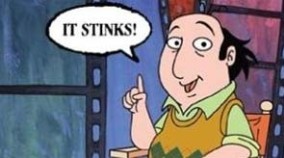
A note on epistemology
Though there is incontrovertible evidence that Tony Blair and his colleagues regularly distort, manipulate, mislead and even invent the truth on a massive scale, they regard any attack on their personal integrity as an outrageous calumny… Blair himself has consistently referred to his own integrity in terms which, coming from anyone else, might well be criticised as boastful or vainglorious. Even when he or colleagues are caught red-handed telling fibs, New Labour tends to respond that all concerned acted “in good faith”, a key phrase frequently uttered in defence of mendacious ministers. In New Labour’s view, the truthfulness of a statement matters much less than whether it was inspired by a virtuous motive…
It is not unreasonable to speculate that the prime minister has a strong tendency to fall victim to a common conceptual muddle: the failure to understand the distinction between truth versus falsehood and truth versus error. Tony Blair, and many colleagues, consistently seem to feel that they are lucky enough to have been granted a privileged access to the moral truth. This state of grace produces two marvellous consequences. It means that whatever New Labour ministers say or write, however misleading or inaccurate, is in a larger sense true. Likewise whatever their opponents say or write, whether or not strictly speaking accurate, is in the most profound sense false.
Peter Oborne, The Rise of Political Lying
The downward spiral
I didn’t particularly want to write again about Johann Hari, and it’s quite difficult for me to do so. It’s very hard to be dispassionate about him, though I’m going to try. Let me say at the outset that, though he’s never given me any great reason to be fond of him, I don’t want to see his life destroyed. I’m fully aware that this must be an absolutely horrible time for him, and I know his many friends are seriously worried about his mental state. I’ll have cause to criticise his employers pretty harshly later on, but I do hope they’ve arranged for him to get whatever help is necessary.
However.
Why, you may ask, should we bother with a man whose career is over? My immediate answer to which is, who says it’s over? Hari has plenty of supporters, some of them prominent in the media, who insist that he’s done nothing really wrong, just made a teensy weensy mistake for which he’s apologised, and he’ll be back again before you know it. No, this will not do. It’s necessary, given the way so many people have taken Hari’s articles as gospel truth, that there be some sort of open accounting. It’s necessary that a light be shone on Simon Kelner and the Independent, who will weasel out of this situation if they’re given a chance. I also don’t believe that the bluster and denial coming from Hari partisans actually helps their friend. It just postpones the inevitable.
To summarise, what Johann Hari has admitted to, and apologised for, is that in a handful of his long-form interviews, he’s occasionally used a quote from the subject’s written work where this was more cogent than what the subject said in the interview; and that he failed to properly acknowledge the source. This is true, as far as it goes. But, as has been shown all over the intertubes, this is just the tip of the can of worms. To summarise, without going into excruciating detail, we’re talking about:
- A somewhat unorthodox interviewing technique that includes not only unattributed lifting from the subjects’ own written work, but also the unattributed lifting of quotes from other journalists’ interviews with the subjects, explicitly framed as if these words were being spoken to Hari himself. It may be understandable that few interviewees complained when the end result showed them being fantastically articulate, but on the occasions when Hari has done hostile interviews he’s had no qualms about portraying his antagonist as inarticulate.
- A strong suspicion, at the very least, that some of his vox-pop quotes (as opposed to those from named interviewees) have been made up.
- A reportorial style that tends to be careless of the facts, straying easily into exaggeration and embellishment, sometimes into outright invention.
- Strong circumstantial evidence, though it would be hard to prove or disprove definitively, that either Hari or someone very close to him was engaged in extensive Wikipedia sockpuppetry, including the posting of allegations about critics of Hari that were flagrantly libellous. (I don’t care what you think about Cristina Odone, she is not anti-Semitic by any stretch of the imagination.)
We’re talking, in short, about a massive failure in professional standards over a period of years, which rather prompts questions about editorial standards at the Independent. We’ll get onto the paper presently, but as for Hari himself I’m much more interested in understanding than condemning. The psychology is fascinating, and I really hope he writes a serious and honest explanation at the end of this – it could be the most compelling thing he’s ever written.
Hari is certainly an interesting character, someone you could write a novel about. As I say, he has many friends – we have a few mutual friends, believe it or not – and they’ll freely talk about what a lovely guy he is, how warm and funny and brilliant and charming and sensitive he is. I have no reason to doubt that – he’s certainly got some charisma, and inspires intense loyalty. I also know from other sources that he can be unbelievably nasty, spiteful and vindictive if you cross him, which is why I have no problem believing the sockpuppetry allegations. His mood swings and occasional prima donna behaviour are the stuff of legend, and even his closest friends – perhaps especially his closest friends – can testify to his volcanic hissy fits. Extremes of light and shade; I know the type.
I said before about Hari that I didn’t think he was a cynical liar out for the main chance, but a well-intentioned bullshitter. That’s why I quoted Peter Oborne, whose book is excellent on the subject of Good Cause Corruption, with particular reference to the career of Mr Tony Blair. If you have moral right and a good cause on your side, then surely inconvenient facts are just a distraction. Accuracy is pedantry. This is positively dangerous from politicians, with dodgy dossiers and the like potentially leading to lots of people getting killed. Which is why you need a press that’s honest, accurate, even pedantic. When journalism falls prey to Good Cause Corruption, it just becomes propaganda. Hari himself once said that he viewed his job as being a paid advocate for the causes he believed in, which might indicate some of the issues behind his journalism.
But I can well understand how he got himself in this position. Formidably bright and articulate, a writer of some talent, he goes straight from Cambridge to the national press, first at the New Statesman and then at the Independent. He never learned the basics of the trade – possibly he was arrogant enough to think he didn’t need to learn anything (he always refused to join the NUJ, which may be significant), and his editors, first Wilby and then Kelner, were prepared to indulge him. Not only that, but Hari, who could have just been a provocative opinion columnist, was rewarded with prominent journalistic assignments that he evidently wasn’t prepared for, with the possibility of failing in a very public way. And, having got in over his head, he tried to get out of this situation by means of (in Duncan Hallas’ immortal phrase) “bluff, bluster and bullshit”.
And not only did he get away with fabulism, he prospered, getting promoted to bigger columns, more high-profile assignments, celebrity interviews, being showered with journalism awards. Perhaps he felt, like a shop assistant nicking twenty quid from the till, that he was being clever in getting away with something. Perhaps he really did think that this was standard journalistic practice. At this point, the thought process is difficult to figure out. Some of the fakery was so stupidly high-risk that you would nearly think he wanted to get caught. The most damaging, for my money, was the interview with gay rugby player Gareth Thomas, who gave a lovely quote about hiding his sexuality and visualising it in terms of being in control of the ball. Trouble was, this quote was taken from a previous interview Thomas had given to Attitude magazine. Gareth Thomas wouldn’t have complained, as he’s a nice guy and Hari had written a sensitive article, but when you think of it – the gay community is Hari’s core audience, Hari writes a column for Attitude, in fact Hari sits on the bloody editorial board of Attitude – either we’ve got a very smart person being incredibly stupid, or unconsciously self-destructive behaviour. From what he’s written in the past about his mental health episodes, I can easily believe the latter. That’s why I hope he’s getting appropriate help.
The reactions
Much of the reaction to the Hari affair has been along the lines of “Yeah, he obviously made a few mistakes but (cough, cough, mumble) look over there, Rebekah Brooks! Also, Andy Coulson!” This does not impress me, and should not impress anyone else with the ability to walk and chew gum at the same time.
The most important point is that, while you could make a political criticism of Hari, and many people have done so, over the years, what’s done for him is professional criticism. Namely, not his opinions but his basic journalistic standards. In fact, more so as the criticism has centred on the technical journalistic side. Tim Worstall has been saying for ages that Hari’s economic writing was wrong not just ideologically but in terms of basic facts, but that was easily dismissed on the grounds that Tim is one of these mad free marketeers and he would say that, wouldn’t he? My own criticisms of Hari have been dismissed on the grounds that I was just sore at him for saying nasty things about the Pope. (Incidentally, one or two people owe me an apology, though I’m not holding my breath.) What has made the difference is people like Brian Whelan or Guy Walters, who don’t have pre-existing beefs with Hari, concentrating on the journalistic basics.
This is also important because one of the reasons he got away with it so long is that, with the notable exception of Biased BBC, most of the small army of media-monitoring blogs out there come from a left-of-centre perspective and concentrate on attacking the Mail or Sun. The smart guys who write them were too heavily involved with fact-checking Melanie Phillips and Richard Littlejohn to notice there might be a problem with a broadsheet columnist who argued the same sort of politics they believed in.
A few observations:
- Criticism of Hari cannot simply be put down to left and right. Yes, the Telegraph has gone after him hard, but so has the New Statesman. Many of Hari’s critics have been from the left; after all, it was the late Paul Foot who christened him “Johann Hari Potter”.
- This is not a gay thing. Some of Hari’s sharpest critics are gay themselves; other gay journalists haven’t had these criticisms levelled at them; and insinuations that this is a homophobic smear campaign frankly don’t hold water – indeed, I’d say it was insulting to gay journalists to think they should be held to a lesser standard, akin to saying Jayson Blair was victimised for being black. If activists turn this into a gay thing, they’ll find it’s a self-defeating strategy.
- Hari’s most prominent media defenders have been opinion writers, activists and social media entrepreneurs. Actual journalists with backgrounds in news reporting have been a lot harsher.
On the other hand, he’s had no shortage of defenders, though they’ve been getting quieter as more details have come out. These come in a number of categories – personal friends, of whom he has many (and it’s quite touching in a way); activists who appreciate how he’s bigged up their causes over the years (and don’t quite realise his downfall may discredit those causes); tribal leftists or gayists who think it’s their duty to defend one of their own no matter what he’s done; and those writers who might be feeling a bit nervous about their own writing, particularly if they’ve relied a lot on Hari in the past. For instance, there is one young writer whose recently-published book’s index reveals no less than thirteen citations from Hari. Some of these people risk making themselves look very silly, and no more so than two or three self-proclaimed scourges of bad journalism who’ve proved to be enormous hypocrites when their mate is put under the microscope. (You know who you are.)
I don’t think, frankly, that loud proclamations to the effect that Hari hasn’t done anything wrong and he still has a bright career ahead of him actually help the guy. Keeping his spirits up is one thing; but the best thing of all would be a resolution. Which neatly brings me to the guilty parties.
The paper and the trade
Let’s be honest, Johann Hari’s career, at least as it’s hitherto existed, is over. It’s a desperately sad outcome for somebody who loved his job so much, who at a relatively young age had been living the dream of having a platform for his beloved good causes, being celebrated in his chosen profession, winning awards, appearing on TV, and of course having a legion of devoted fans. (Young people don’t read newspapers as a rule, but the two writers you very commonly see shared and retweeted are Hari and Charlie Brooker.) But this would be hard to recover from for any journalist, let alone one whose stock in trade was banging on and on about his own integrity, other journalists’ lack of integrity, and how he was the man who was telling you the truth. Now, he’ll never be able to speak in a debate again without this being thrown in his face, and while there are lots of people who’ll never believe anything bad about him, that sort of denial isn’t sustainable for any media outlet that might employ him.
In my view, the best outcome would be this: Hari writes a full and frank account of what he did and why he did it; the Independent runs an analysis of how this was allowed to happen, as the New York Times did in the Jayson Blair case; Simon Kelner gives a personal account of his role in the affair; and then Hari can go off and rebuild his life. If he insists on working in journalism, he’ll have to do what he never did in the first place and work his way up from the bottom; on the other hand, he could turn out to be a great novelist, or an amazing charity campaigner, or any number of other things. He’s a bright man and still young.
But the current ass-covering at the Independent does nobody any favours. You know, when Boris Johnson was caught making up a quote, the Times didn’t fart about with two-month suspensions; Boris was summarily sacked, had to go and work on the Wolverhampton Express & Star, and didn’t get back into Fleet Street until he’d learned his lesson. My instinct is that this drawn-out process is all about editorial saving of face.
Make no mistake, this is a personal tragedy for Johann Hari, but it’s a farce for the Indy’s pretentions of holding higher standards than the rest of the press. Some of this, to be fair, has to do with endemic problems in the newspaper trade. Formal training for journalists is more or less a thing of the past. The local papers, where young hacks got valuable on-the-job training in the basics, are rapidly going bust. Subbing is a dying art.
Moreover, with the Mail and the Sun being the only national papers to regularly turn a healthy profit, there’s less scope for maintaining a large and experienced workforce of journalists. That means, very often, young, inexperienced (and cheap) hacks being overpromoted. More and more this is through headhunting from the student press, the music press, or more recently the blogosphere. The practice is to take some inexperienced kid and throw them in the deep end, with results that aren’t always for the best. (This is why I worry about Laurie Penny, whom I like a good deal more than I do Johann Hari, and whose undoubted talent I’d hate to see wasted.)
Another problem is the growth of celebrity columnists – whether comedians, TV critics or activists – at the expense of trained journalists, in contrast to the old days when hacks would be given columns when they were getting old and not as mobile as they used to be. The Indy (it’s a viewspaper, remember) is a particularly bad example, but some other papers are catching up. Yet another issue is the practice of journalists failing to maintain some distance from their story. I blame Hunter Thompson for this – he was brilliant enough to get away with it, but the price of that is a slew of bad imitations of Hunter Thompson. The Saturday edition of the Guardian is full of them.
But let’s specifically talk about the Indy. Simon Kelner’s assertion that, in ten years, nobody had ever complained about the Hari column is a black lie. I know that personally. Nor does it speak well of Kelner’s judgement that his first reaction to the Hari scandal was not to examine the evidence but to attempt to brazen it out, even sneaking the Hari column back into the paper (with Disqus comments disabled) when everybody else was preoccupied with Murdoch. And maybe he could have brazened it out – after all, the Guardian still employs Emma Brockes – had it not been for the sheer mountain of evidence. And then, of course, Kelner being kicked upstairs to editor-in-chief.
Face-saving is an issue because (and this is also true, mutatis mutandis, of the phone-hacking scandal) we can believe that a journalist was guilty of malpractice once or twice, but if he was consistently guilty for ten years, we have to ask where the editor was all this time. If we’re talking about that severed heads story from the Central African Republic, the thing I find hard to believe is not that Hari would embellish a story like that, but that the Indy backroom didn’t call him and say “Seriously, Johann, wtf? Are you saying that really happened?” Then again, while I say subbing is a dying art, the Indy was opposed to having subs at its inception…
Again and again, we come back to Kelner. He hired a raw young star about whom doubts had already been expressed at the New Statesman, and relentlessly promoted and protected him. Hari didn’t get the firm editorial hand a young journalist needs; his columns don’t seem to have been subjected to fact-checking or serious editing (comparing Hari’s columns on the Indy site with his own site, one sees that Indy editorial broke up his long paragraphs and corrected a few obvious howlers, but little else); he clearly was never given the training or mentoring he needed (and if Hari thought he didn’t need training, Kelner should have insisted). Hari was given plenty of resources – one hears stories of Indy interns doing mountains of photocopying that would then be couriered over to the great man (couriered, I ask you, as if he was Peter fucking Mandelson) – but didn’t give him what he really needed, a guiding hand. More experienced hacks who had concerns about the infant prodigy’s work soon learned that the editor didn’t want to hear these criticisms.
Which, in the end, only ensured a greater debacle when it all eventually came unstuck. And the two-month suspension plus internal inquiry just reeks of a spin exercise. Not that I don’t expect Andreas Whittam Smith to conduct the inquiry with integrity, but there is already enough prima facie evidence to sack him several times over. There is the Indy forbidding Hari from speaking publicly; there is the Indy persuading the council of the Orwell Prize to delay its announcement on Hari’s 2008 award. A charitable view would be that the Indy doesn’t want to get scooped on its own scandal; a cynical view would be that Indy editorial are trying to puzzle out a way to spin themselves out of this with minimum loss of face. Someone should tell Chris Blackhurst that sometimes, fronting up is the best PR strategy.
You know, when you see headlines about the death of Amy Winehouse, or about Charlie Sheen’s latest escapades, it’s worth remembering that celebrities don’t go off the rails alone; they have a posse of enablers who have too much invested in the celeb’s lifestyle to try and straighten them out. For Johann Hari, though I’m not a fan of his, I have some sympathy; for Simon Kelner, none at all. Hari himself is a young, intelligent, idealistic guy who wanted above all else to be a Great Journalist, and thought (or was led to believe) he was so brilliant he could do it without putting in the effort. As for his enabler… Ann Leslie said we shouldn’t be too harsh on young Johann because he’d never been a real journalist. Maybe Simon Kelner was never a real editor.









